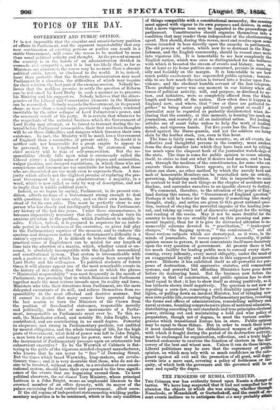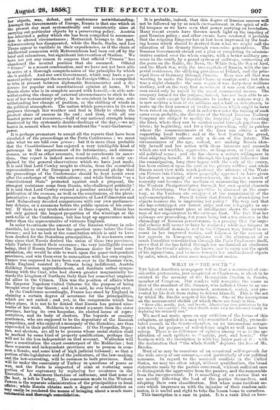111/. PROGRESS OF RUSSIA CONTINUED.
THE Crimean war has evidently, forced upon Russia a change of tactics. We have long suspected that it had not compelled her to abandon the objects at which she was aiming, whether through Nesselrode, or Mensohikoff, or Gortsohakoff, and the result of re- cent events inclines us to anticipate that she may probably attain
objects, war, defeat, and conferences notwithstanding. her Amongst the Governments of Europe, Russia is that one which at
the present day most systematically and consistently aims at carrying out particular objects by a persevering policy. Austria has inherited a policy which she has been compelled to accommo- date to altered circumstances ; Mettermch belongs to the past, Schwarzenberg has disappeared, .while the Buols, Bache, and Leo Thum; appear to vacillate in their expediencies, as if the chain of intellectual connexion with Metternichism had been cut off by the brief and calamitous, but significant intervention of Stadion. We have not yet any reason to suppose that official " Prussia " has abandoned the neutral position that she assumed. Official "France" is a. recent combination, and we have not yet been able to arrive at a thorough comprehension of the principles by which she is guided. And our own Government, which may have a per- manent policy amongst the secrets of its Foreign Office, is compelled to trim at present between diplomatic freemasonries and a de- ference for popular and, constitutional opinion at home. It is Russia alone who is in complete accord with herself,—is able not- withstanding the change of external circumstances to stick to the text of her testamentary policy, to be consistent in her aim, not- withstanding her change of position, or the shifting of winds in the political atmosphere. The nation which perseveres in its own purposes through fair weather and foul is likely to obtain the greatest share of success in the end ; and thus, with all our boasted power and resources,—half of our national strength being frustrated by the systematic double-dealings of the day,—we are beaten in council when we have to confront the " semi-barbarous " power. It is perhaps premature to accept all the reports that have been circulated of the proceedings at the Paris Conferences ; we must take what we are told cum grano ; but it is more than probable that the Constitutionnel has enjoyed a very intelligible kind of patronage in the acquirement of its information, and, circum- stances, as well as other accounts, tend to corroborate its asser- tions. One report is indeed most remarkable, and is only ex- plained by the general observations which we have just made. It is said that Lord Cowley sought to obtain, from the assembled representatives of the European powers, a personal pledge that the proceedings of the Conferences should, be kept secret even after the exchange of the ratifications ; and while Sardinia "as a Constitutional State" protested. against such a proposal, the strongest resistance came from Russia, who challenged publicity ! It is said that Lord Cowley evinced a peculiar anxiety to avoid a publication of the reasons, as well as the conclusions, of the pleni- potentiaries ; as though the representative of Lord. Palmerston and Lord Malmesbury dreaded comparisons with our own parliamen- tary debates, or a summons before the public opinion of his coun- try. If there is any truth whatever in these reports, Russia has net only gained the largest proportion of the winnings at the card-table of the Conferences, but has kept up appearances much better than the representative of virtuous England. In order to estimate the amount of the Russian victory in sub- stantials, let us remember how the question came before the Con- ference; and let us look at the constitution which is said to have been drafted for the Danubian principalities. It was known some time since that Russia desired the union of those two provinces, while Turkey desired their severance ; the very intelligible reason being, that if Russia favoured the Rouman desire for local con- solidation, she would be able to work upon the quasi-independent provinces, and win them over to annexation with her own empire. France was supposed to have been won over to the Russian view, while England resisted. it ; Prussia being indifferent, Austria disliking Russian aggrandisement, and Sardinia rather sympa- thizing with the Czar, who had. shown greater magnanimity to- wards the kingdom of Northern Italy than her somewhat ungrate- ful allies in the Crimea. This was the position of affairs when the Emperor Napoleon visited Osborne for the purpose of being brought over by our Queen ; and it is said, he was brought over.
In the Conference accordingly, France has stood by England in claiming a certain degree of severance for the principalities, which are not united ; and yet, in the compromise which has taken, place, it is not to be denied that Russia has gained nine- tenths of her wish. Moldavia is to stand separate from the sister province, having its own hospodar, its elected house of repre- sentatives, and its body of electors. The boyards or country gentlemen, who are supposed: to be the depository of the Russian sympathies, and who enjoyed a monopoly of the franchise, are thus stipersede& in their political importance. If the Hospodar, Depu- ties, and electors, are all to be persons whose social station shall be marked. by some kind of property qualification, perhaps they will not be the less independent on that account. Wallachia will have a constitution the exact counterpart of the Moldavian ; but these separate and independent provinces are to possess in com- mons. Senate, and some kind of high judicial tribunal; so that a portion of the legislature and of the judicature, of the law-making and the law-executing, will be common to both provinces. Both will he under the suzerainty of Turkey in questions of peace or War, and the Porte is suspected of aims at restoring some
portion. of her supremacy by replacing her creatures in the Executive. A minimum therefore of intliience, and that none of the best, is left to Turkey. The concession made to the Western. Powers is the separate administration of the principalities in local affairs; while Russia obtains such a degree of consolidation as may easily be rendered. the means of bringing about a much more substaaatial and thorough consolidation.
It is probable, indeed, that this degree of Russian success will not be followed up by so much encroachment in the spirit of
wil- ful trespass as we have seen that power carrying on heretofore.. Many recent events have thrown much light on the impolicy of past Russian policy ; and other events have rendered it probable that the reigning Emperor has at last been impressed by the lead- ing lesson which should be. derived from what we might call the education of his dynasty through successive generations. The Russian Government struck out a plan of completing its adminis- trative control over the whole empire, with a better military pre- sence in the south, by a grand system of railways, connecting all the ports on the Baltic, the Neva, the White Sea, the Sea of Azof, and the Black Sea, with the two capitals of Russia, with the im- perial residences, the off-lying provinces of Poland, and the prin- cipal lines of Germany through Prussia. Here was all that was wanting to make the Imperial Chancery omnipresent ; but there was a slight obstacle: the sum required was forty-four millions sterling, and on the very first movement it was seen that such a sum could only be raised by the usual counneecial means. The company formed, for the purpose, iadeed, has not been able to se- cure the cash except by instalments iu rather a tedious way ; it is now seeking .a loan of six millions and a half on debentures, to make up the first amount of twelve millioas which ought to have been raised on shares. And in order to render the raising of such sums even probable, the directors of the Grand Russian Railway Company are obliged to modify the Imperial plan by diverting, the lines, where they can be carried round through populous dis- tricts; by beginning, and for a time proceeding, only in patches where the commencements of the lines can obtain a self- supporting local traffic ; and at the best leaving the grand, imperial, military scheme only a dream of the future. The circumstances of the age, indeed, are making Russia iden- tify herself and her action with those interests and counsels which are not warlike, aggressive, or dangerous, at.least in the old political sense ; and she has shown a certain willingness in thus adapting herself. It is through the idiperial influence that the emancipation, long since begun with the serfs of the crown, has been enforced upon the serf:: of the private nobles ; and while Russia must view with much jealousy the advance of the West- ern Powers into China, where geography appeared to have given her almost a monopoly of encroachment, she makes a merit of necessity and becomes the medium of announcing the success of the Western Plenipotentiaries through her own special channels at St. Petersburg. Our Foreign ()Mee is charmed at the cour- tesy, as the Yankees are overjoyei at the magnanimity of the serf-emancipation. Does it follow that Russia is abandoning her objects because she is improving her policy I' The very fact that she has outstripped our fastest ships and our telegraphs in an- nouncing an important piece of intelligence shows the forward- ness of her organization in the extreme • East. The fact that her railways are proceeding, ten years being but a ten minutes in the chronology of Russian perseverance, is a promise tbot the impe- rial scheme will sooner or later be realized ; while her failures in the Menschikoff demands and in the Crimean war, turned to ac- count in her improved tactics, and followed by the success of her appeals to European opinions and the attainment of so much Danubian consolidation through the Paris Conference
prove that if she has failed through too mechanical an obedience to Peter the Great's advice, she knows how to carry out the spirit of his injunctions, and to move towards her unabandoned objects by safer, wiser, and even more magnificent routes.



























 Previous page
Previous page